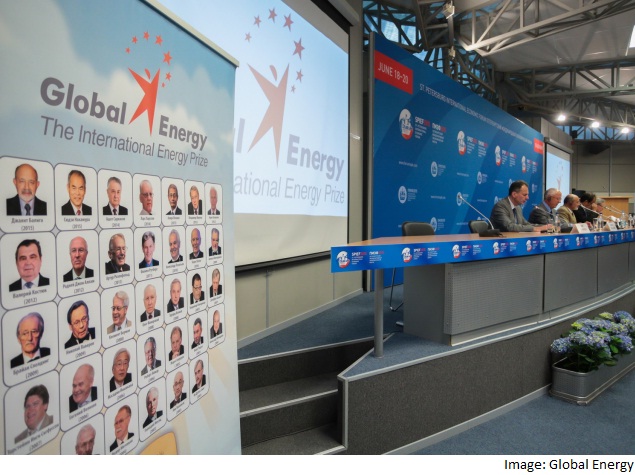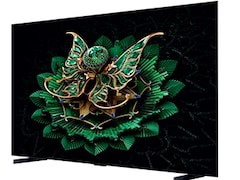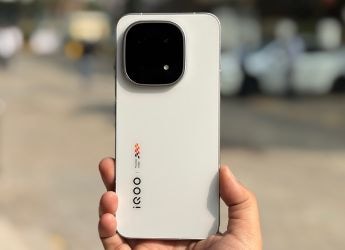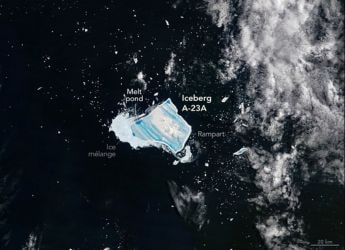- Home
- Science
- Science News
- Falling Rouble Cuts Value of 'Electronic Noble' Prize for Recipients
Falling Rouble Cuts Value of 'Electronic Noble' Prize for Recipients

The Global Energy Prize, though not a government award, is looked upon in Russia as the 'electronics Nobel'. It was given to Nobel Laureate Shuji Nakamura for his contribution to white LED light technology, which is derived from his invention of blue LED for which he had received the Nobel Prize in Physics in 2014.
The prize was shared by B. Jayant Baliga, professor at North Carolina University for his invention of the digital switch or the insulated gate bipolar transistor (IGBT) which has raised efficiency of all digital equipment and computer hardware and all powered machines, saving trillions of dollars for consumers around the world.
The prize was presented by President Putin at the St. Petersburg International Economic Forum. The prize was established by several top Russian energy companies.
The Rouble 33-million (roughly Rs. 3.8 crores) award, though, has lost much of its value because of the decline in the Russian currency. It was equivalent to over a $1.2 million dollars (roughly Rs. 7.6 crores) but at today's rate it would be only around $550,000 (roughly Rs. 35 lakh) to be shared equally by the two recipients. But the recipient felt that the global honour which came with the prize was more important.
Nakamura said that his next big venture was development of white laser light, which will increase the efficiency of all equipment which uses light in any form. "The light would be 1,000 times brighter, and would occupy space of half a millimetre by half a millimetre only," the Nobel Laureate told IANS.
He said the invention was still at a work-in-progress stage and it would take at least five years before it would be commercially available. But it would double the efficiency of laser lights to around 60 percent from what is available at present. "My dream is to bring about 100 percent efficiency, in the sense that nothing is lost in producing the light, although we may never achieve it. But I would be happy with 95 percent," Nakamura said.
He had developed his blue LED technology while working for Nichia Chemical Corporation in Japan, which just paid him $180 (roughly Rs. 11,400) for his efforts. He was so incensed that he sued his former company for discovery bonus, ultimately settling for $9 million (roughly Rs. 1 crores) after the company went on appeal against a successful lower court order.
Professor Nakamura has written over 550 papers in his field in peer-review journals, and is now teaching at the University of California, Santa Barbara in the US.
Professor Baliga said that he had received several awards in the US, including the highest award for technology given by President Barack Obama last year, but this was the first global recognition of his work which had saved more than $27 trillion (roughly Rs. 63,52,067 crores) in efficiency and fuel not used. He said his digital switch means that the world has had to build 1,666 less 1-gigawatt power plants over the last two decades, saving billions of dollars and millions of tonnes of carbon emissions into the atmosphere.
Catch the latest from the Consumer Electronics Show on Gadgets 360, at our CES 2026 hub.
Related Stories
- Samsung Galaxy Unpacked 2025
- ChatGPT
- Redmi Note 14 Pro+
- iPhone 16
- Apple Vision Pro
- Oneplus 12
- OnePlus Nord CE 3 Lite 5G
- iPhone 13
- Xiaomi 14 Pro
- Oppo Find N3
- Tecno Spark Go (2023)
- Realme V30
- Best Phones Under 25000
- Samsung Galaxy S24 Series
- Cryptocurrency
- iQoo 12
- Samsung Galaxy S24 Ultra
- Giottus
- Samsung Galaxy Z Flip 5
- Apple 'Scary Fast'
- Housefull 5
- GoPro Hero 12 Black Review
- Invincible Season 2
- JioGlass
- HD Ready TV
- Laptop Under 50000
- Smartwatch Under 10000
- Latest Mobile Phones
- Compare Phones
- OnePlus Turbo 6V
- OnePlus Turbo 6
- Itel Zeno 20 Max
- OPPO Reno 15 Pro Mini 5G
- Poco M8 Pro 5G
- Motorola Signature
- Vivo Y50e 5G
- Vivo Y50s 5G
- Lenovo Yoga Slim 7x (2025)
- Lenovo Yoga Slim 7a
- Realme Pad 3
- OPPO Pad Air 5
- Xiaomi Watch 5
- Huawei Watch 10th Anniversary Edition
- Acerpure Nitro Z Series 100-inch QLED TV
- Samsung 43 Inch LED Ultra HD (4K) Smart TV (UA43UE81AFULXL)
- Asus ROG Ally
- Nintendo Switch Lite
- Haier 1.6 Ton 5 Star Inverter Split AC (HSU19G-MZAID5BN-INV)
- Haier 1.6 Ton 5 Star Inverter Split AC (HSU19G-MZAIM5BN-INV)
















